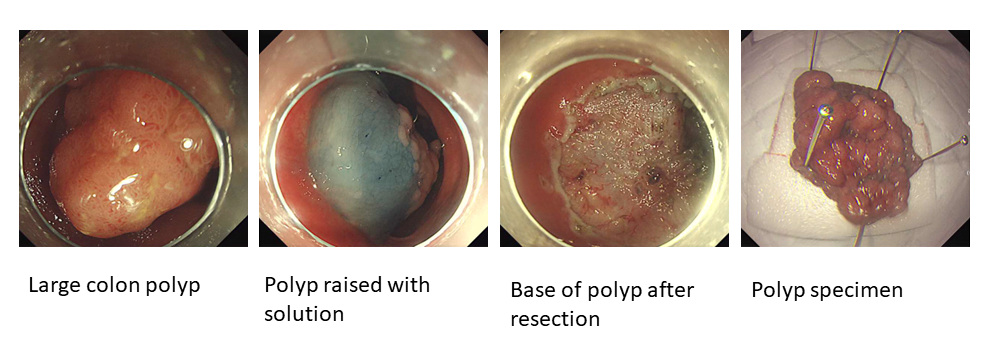Advanced Endoscopic Polypectomy
Advanced Endoscopic Polypectomy – Techniques, Risks, and Alternatives in Singapore
What is advanced endoscopic polypectomy?
Advanced endoscopic polypectomy is a minimally invasive technique used to remove large or complex polyps (abnormal growths) in the gastrointestinal tract. This technique is performed using an endoscope equipped with specialized tools, such as snares, forceps, and electrocautery devices.
Advanced endoscopic polypectomy typically involves two main techniques: Endoscopic mucosal resection (EMR) and Endoscopic submucosal dissection (ESD).
Endoscopic mucosal resection (EMR) is a technique used to remove larger polyps that have not yet invaded the deeper layers of the gastrointestinal wall. This technique involves injecting a solution beneath the polyp to lift it away from the underlying tissue, and then removing it using a snare or forceps.
Endoscopic submucosal dissection (ESD) is a more advanced technique used to remove larger or more complex polyps that have invaded the deeper layers of the gastrointestinal wall. ESD involves creating an incision in the mucosa and then carefully dissecting the submucosal layer to remove the polyp.
What are the contra indications for advanced endoscopic polypectomy (EMR/ESD)?
Some of the most common contraindications for EMR/ESD include:
Large or advanced tumours: EMR/ESD is not recommended for larger tumours that have invaded the muscularis propria layer of the gastrointestinal wall, as these lesions have a higher risk of lymph node metastasis and may require more extensive surgical intervention (oncological resection).
Anticoagulant therapy: Patients taking anticoagulant or antiplatelet medications may be at increased risk of bleeding during the procedure and may need to discontinue these medications prior to undergoing EMR/ESD.
Anatomical abnormalities: Certain anatomical abnormalities or strictures in the gastrointestinal tract may make it difficult or impossible to perform EMR/ESD safely.
Patient preference: EMR/ESD may not be appropriate for patients who prefer a more conservative treatment approach, or who are not willing to accept the potential risks associated with the procedure.
Is advanced endoscopic polypectomy (EMR/ESD) painful?
EMR/ESD is typically performed under sedation or general anaesthesia, which helps to minimize any pain or discomfort during the procedure. After the procedure, patients may experience mild discomfort or soreness in the treatment area, but this can usually be managed with over-the-counter pain medications and typically resolves within a few days.
Are there any risks associated with advanced endoscopic polypectomy (EMR/ESD)?
Some of the most common risks of EMR/ESD include:
Bleeding: EMR/ESD may cause bleeding, especially in patients who are taking anticoagulant medications or who have large or advanced tumors.
Perforation: EMR/ESD can cause a hole or perforation in the gastrointestinal wall, which may require additional treatment or emergency surgery.
Stricture formation: In some cases, EMR/ESD may cause scarring or narrowing of the gastrointestinal tract, which may require additional treatment or management.
Are there any alternative to advanced endoscopic polypectomy (EMR/ESD)?
Some alternatives to EMR/ESD include:
Laparoscopic surgery: Laparoscopic surgery involves the use of small incisions and specialized instruments to remove larger or more complex gastrointestinal neoplasms, and may be appropriate for lesions that cannot be removed by endoscopic techniques.
Open surgery: In some cases, open surgery may be necessary to remove large or advanced gastrointestinal neoplasms that cannot be treated by less invasive approaches.
Watchful waiting: For some gastrointestinal neoplasms, especially those with a low risk of progression or metastasis, a watchful waiting approach may be appropriate, in which the patient is closely monitored with regular endoscopic exams to assess any changes in the lesion over time.
The choice of treatment approach will depend on a variety of factors, and should be made in consultation with a qualified physician who can help determine the most appropriate and effective treatment plan for each individual patient.
Book Appointment
Book your consultation today for expert surgical care.

